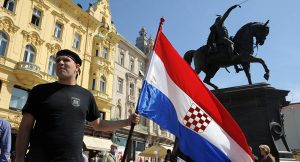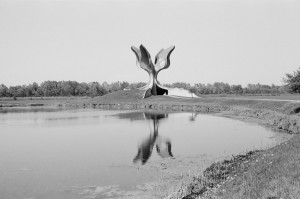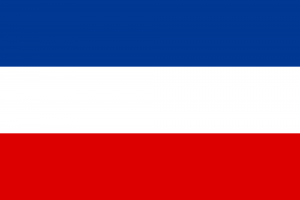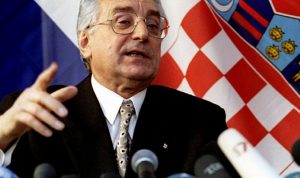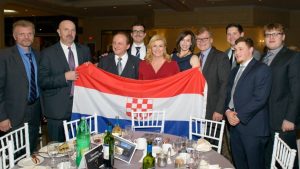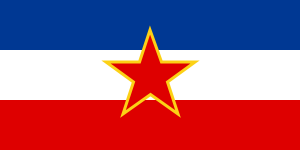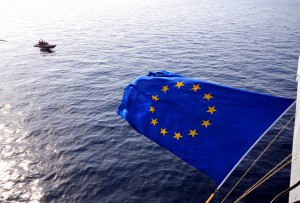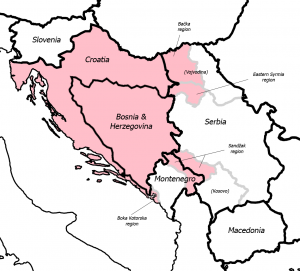Jewish and Serb organisations have boycotted the official commemoration at the Jasenovac concentration camp since the Croatian...
Croatia
Many Croatian schoolchildren know little about crimes committed under the country’s World War II-era fascist regime –...
Efraim Zuroff, the chief Nazi-hunter of the Simon Wiesenthal Center, tweeted the following just before the event:...
The range of moral and political issues raised by the Ustaša movement and the regime it established...
Despite laws against the denial or diminishment of genocide crimes, the EU’s newest member state has done...
This paper sets out to examine and clarify the historical development of the ideological concept of Pan-Slavism,...
The ultraright-wing ideology on which the state-building process was executed in Croatia in the 1990s was fundamentally...
Probably, the HDZ’s deny of any kind of the regional autonomy in Croatia was the expression of...
Today, as a result of the HDZ’s policy of extreme ethno-confessional nationalism, Croatia is, since mid-1995, “more...
As for a Montenegrin Highlander Slobodan Milošević, his principal concerns were staying in power, and all other...
P. R. Vitezović’s writings were especially directed against pro-Venetian texts of the famous historian and doctor of...
The article will examine the model for the creation of a Greater Croatia designed by a Croatian...
At the very start, it must be mentioned that Nazi Croatia during WWII (1941−1945) concerning its inner...
As a result of the Polonization of the vast territories of East-Central Europe from 1569 to 1795...
An article published by Croatia’s best-read newspaper downplaying the atrocities at the Jasenovac concentration camp was an...
When two ministers praised two Croatian war criminals last week, it highlighted senior officials’ moral failure to...
On September 10th, 2015 a City Council of Croatia’s capital Zagreb decided to promote a war criminal...
‘Operation Storm’ in August 1995, when Croatia overran the Serb-inhabited territory of Krajina, was the biggest single...
The Vatican’s Complicity in Genocide in Fascist Croatia: The Suppressed Chapter of Holocaust History


The Vatican’s Complicity in Genocide in Fascist Croatia: The Suppressed Chapter of Holocaust History
The origins of fascism in the Balkans can be traced directly back to Mussolini and the imperialist...
Mass Killings of Serbs for Organs Only Boosted in Kosovo, But it Started Earlier in Croatia, Vukovar


Mass Killings of Serbs for Organs Only Boosted in Kosovo, But it Started Earlier in Croatia, Vukovar
Contrary to the popular belief, the bloodiest trade in history (when organs were taken away from captured...
The recent 70th anniversary of the liberation of Auschwitz was a reminder of the great crime of...
The Republic of Croatia has, since its independence, often reverted to the imagery of its Second World...
The NDH was internationally recognized by Germany, Italy, Slovakia, Hungary, Romania, Japan, Spain, National China, Finland, Denmark,...
Excerpt from book God and the Fascists: The Vatican Alliance with Mussolini, Franco, Hitler, and Pavelić, by...
It was in 2015 hundred years anniversary of secret treaty signed between three Entente members of the...
Anti-communist campaigns in Eastern Europe aren’t about building a more democratic society — they’re about rehabilitating the...
Yugoslavia as a state was officially created hundred years ago on December 1st, 1918 as the Kingdom...
That a Serb Question in Yugoslavia was really acute problem became clear on April 24th, 1987 [...]
Political Language Explained: Difference between the declarations and the practice [...]
The September 24, 1942 visit by NDH leader Ante Pavelic to Golubinskaya outside of Stalingrad was the...
A new 1991 year started with a fear of the escalation of the political conflicts into a...
The major Roman ratline was operated by a small, but influential network of Croatian priests, members of...
Just four simple words, yet taken together they constituted a blatant violation of the Yugoslav constitution [...]
The National Committee of Croatia for the investigation of the crimes of the occupation forces and their...
The book of evidence about ethnic cleansing and policy of genocide committed by the neo-Nazi Ustashi government...
Interview with Professor Sean Gervasi, Institute of International and Economic Problems, Belgrade, Yugoslavia. Recorded on February 24th,...
Over the past several years, analysts and commentators have noticed a rising tide of domestic support for...
The Croat ultranationalists (i.e., the followers of the Ustashi movement) called in the 1990s for the full...
Missile compounds are being erected in Romania, Poland and other ex-Soviet countries, while military games are set...
Manipulation is the key to understanding why Auschwitz was given so much coverage, and Jasenovac almost none...
The so called "Croatian scenario", is something that has been periodically brought up after the start of...
The book describes the activities of the Roman Catholic clergy in the Kingdom of Yugoslavia, including their...
De facto (linguistically), Serbian, Croatian, Bosnian and Montenegrin languages are part of one standard-linguistic system. They express...
Stories of resistance to Croatia’s fascist Ustasa can help counter revisionists’ attempts to rehabilitate the World War...
The destruction of the Serbian economy, by the Serbian Government, on the orders of Washington and Brussels,...
The radical and revisionist messages of far-right Croatian politicians and historians find a sympathetic audience among many...
Yugoslavia was a multinational country with different national and ethnic groups coexisting together and two dominant nations...
The Serb holocaust during the WWII in the Independent State of Croatia is not a misnomer, an...
Croatia’s president, the former deputy NATO secretary general for public diplomacy Kolinda Grabar-Kitarovic, decided to pay homage...
In the Yugoslav historiography (1918–1941; 1945–1991) Lj. Gaj’s decision to choose a Illyrian name and the štokavian...


